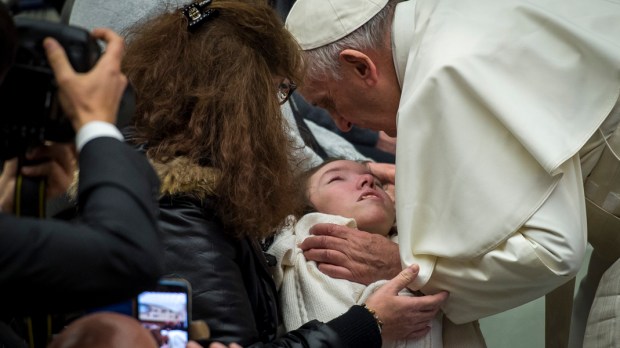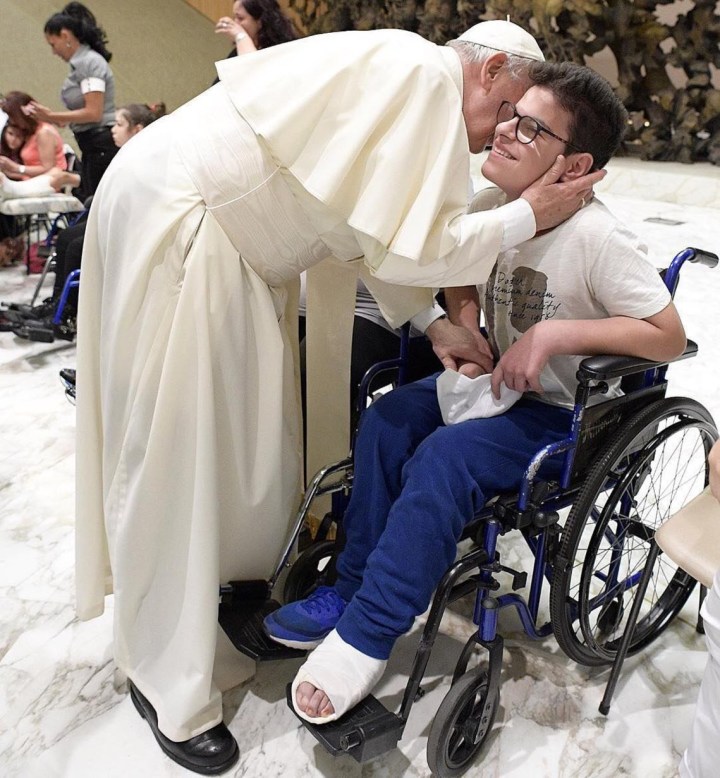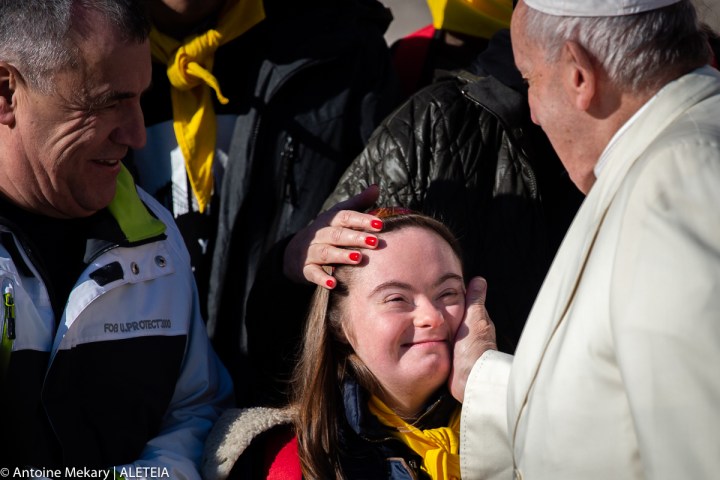Pope Francis released at the end of November his message for the International Day of Persons with Disabilities, marked on December 3.
The Pope reflects in his message on how Jesus in our friend and the Church is our home, and how the Gospel is for everyone.
A trusting and personal friendship with Jesus can serve as the spiritual key to accepting the limitations that all of us have, and thus to be at peace with them.
The Pope has a special request of those with disabilities: “I ask you to pray.”
Prayer is a mission, a mission accessible to everyone, and I would like to entrust that mission in a particular way to you. […] This is something each of us can do; and even if, like Moses, we will have need of support (cf. Ex 17:10), we are confident that the Lord will hear our plea.
~
Here is the full text of his message:
“You are my friends” (Jn 15:14)
Dear brothers and sisters!
As we celebrate your International Day, I would like to speak directly to all of you who live with any condition of disability, to tell you that the Church loves you and needs each of you for the fulfilment of her mission at the service of the Gospel.
Jesus, our friend
Jesus is our friend! That is what he told his disciples at the Last Supper (cf. Jn 15:14). His words also speak to us; they shed light on the mystery of our close relationship to him as members of his Church. “Friendship with Jesus cannot be broken. He never leaves us, even though at times it appears that he keeps silent. When we need him, he makes himself known to us; he remains at our side wherever we go” (Christus Vivit, 154). We Christians have received a gift: access to the heart of Jesus and friendship with him. It is a privilege and a blessing, and it becomes our vocation: we are called to be friends of Jesus!
Having Jesus as a friend is an immense consolation. It can turn each of us into a grateful and joyful disciple, one capable of showing that our frailties are no obstacle to living and proclaiming the Gospel. In fact, a trusting and personal friendship with Jesus can serve as the spiritual key to accepting the limitations that all of us have, and thus to be at peace with them. This in turn can lead to a joy that “fills hearts and lives” ( Evangelii Gaudium, 1), since, as a great exegete has written, friendship with Jesus is “a spark that kindles the fire of enthusiasm”. [1]
The Church is your home
Baptism makes each one of us a full-fledged member of the Church community, so that all of us, without exclusion or discrimination, can say: “I am Church!” The Church is truly your home! We, all of us together, are Church, because Jesus chose to be our friend. The Church – and this is something we need to learn more and more in the synodal process we have begun – “is not a community of people who are perfect, but a community of disciples on a journey, who follow the Lord because they know they are sinners and in need of his forgiveness” ( Catechesis, 13 April 2016). In this people which, guided by God’s word, advances amid the events of history, “everyone has a part to play; no one is a mere extra” ( Address to the Faithful of Rome, 18 September 2021). For this reason, each of you is also called to make his or her own contribution to the synodal journey. I am convinced that, if it truly becomes “a participative and inclusive ecclesial process” [2], the Church community will be genuinely enriched.
Sad to say, even today many of you “are treated as foreign bodies in society”; you can “feel that [you] exist without belonging and without participating” and that “much still prevents [you] from being fully enfranchised” (Fratelli Tutti, 98). Discrimination continues to be all too present at various levels of society; it feeds on prejudice, ignorance and a culture that finds it hard to appreciate the inestimable value of each person. In particular, the continuing tendency to regard disabilities – which are the result of the interaction between social barriers and each person’s limitations – as if they were a kind of disease, contributes to keeping your lives separate and stigmatizing you.
As far as the Church’s life is concerned, “the worst form of discrimination… is the lack of spiritual care” (Evangelii Gaudium, 200). Sometimes, as certain of you have unfortunately experienced, this has taken the form of denying access to the sacraments. The Church’s magisterium is very clear in this area, and recently the Directory for Catechesis stated explicitly that “no one can deny the sacraments to persons with disabilities” (No. 272). When we experience such discrimination, it is precisely our friendship with Jesus, that all of us have received as an undeserved gift, which redeems us and enables us to perceive differences as a treasure. For Jesus does not call us servants, women and men of lesser dignity, but friends: confidants worthy of knowing all that he has received from the Father (cf. Jn 15:15).
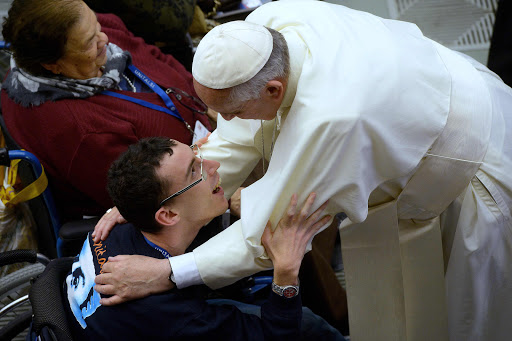
In times of hardship
Jesus’ friendship protects us in moments of difficulty. I am well aware that the Covid-19 pandemic, from which we are struggling to emerge, continues to have grave repercussions on many of your lives. I think, for example, of your being forced to stay at home for long periods of time; the difficulty experienced by many students with disabilities in accessing aids to distance learning; the lengthy interruption of social care services in a good number of countries; and many other hardships that you have had to face. Above all, I think of those of you who live in residential facilities and the pain of forced separation from your loved ones. In those places, the virus hit hard and, despite the dedication of caretakers, it has taken all too many lives. Know that the Pope and the Church are especially close to you, with love and affection!
The Church stands beside those of you who are still struggling with the Coronavirus. As always, she insists that everyone be provided with treatment, and that disabilities not prevent access to the best care available. In this regard, some Episcopal Conferences, such as that of England and Wales [3], and the United States, [4] have already intervened to demand respect for the right of everyone, without discrimination, to medical care.
The Gospel is for everyone
Our vocation arises from our friendship with the Lord. He has chosen us to bear much fruit, fruit that will remain (cf. Jn 15:16). As the true vine, he wants every branch, in union with him, to bear fruit. Yes, Jesus wants us to attain “the happiness for which we were created. He wants us to be saints and not to settle for a bland and mediocre existence” (Gaudete et Exsultate, 1).
The Gospel is also for you! Its message is addressed to everyone; it is a word of consolation and, at the same time, a summons to conversion. The Second Vatican Council, in speaking of the universal call to holiness, teaches that “all the faithful of Christ of whatever rank or status, are called to the fullness of the Christian life and to the perfection of charity… In order that the faithful may reach this perfection, they must use their strength accordingly as they have received it, as a gift from Christ… They must devote themselves with all their being to the glory of God and the service of their neighbor” (Lumen Gentium, 40).
The Gospels show that whenever persons with disabilities met Jesus, their lives changed profoundly, and they became his witnesses. Such was the case, for example, of the man blind from birth who, after being healed by Jesus, boldly declared to everyone that Jesus was a prophet (cf. Jn 9:17). Many others joyfully proclaimed what the Lord had done for them.
I know that some of you live in situations that are not easy. I would like to speak personally to each of you, and I ask that, if necessary, your family members or those closest to you read my words to you, or convey my appeal. I ask you to pray. The Lord listens attentively to the prayers of those who trust in him. No one should say: “I don’t know how to pray,” because, as the Apostle says, “the Spirit comes to the aid of our weakness; for we do not know how to pray as we ought, but the Spirit himself intercedes with inexpressible groanings” (Rom 8:26). In the Gospels, Jesus always listens to those who turn to him, however haltingly, even with a small sign (cf. Lk 8:44) or a cry for help (cf. Mk 10:47). Prayer is a mission, a mission accessible to everyone, and I would like to entrust that mission in a particular way to you. There is no one so frail that he or she cannot pray, worship the Lord, give glory to his holy Name and intercede for the salvation of the world. In the sight of the Almighty, we come to realize that we are all equal.
Dear brothers and sisters, today your prayers are more urgently needed than ever before. Saint Teresa of Avila wrote that “at times of difficulty, God’s friends need to be strong in order to support those who are weak”. [5] This time of pandemic has clearly shown us that we are all weak and vulnerable: “We have realized that we are all on the same boat, fragile and disoriented, but at the same time important and needed; all of us are called to row together”. [6] The primary way to do so is precisely by praying. This is something each of us can do; and even if, like Moses, we will have need of support (cf. Ex 17:10), we are confident that the Lord will hear our plea.
To all of you I send my prayerful greetings and good wishes. May the Lord bless you, and may Our Lady watch over you always.
Rome, Saint John Lateran, 20 November 2021
Francis
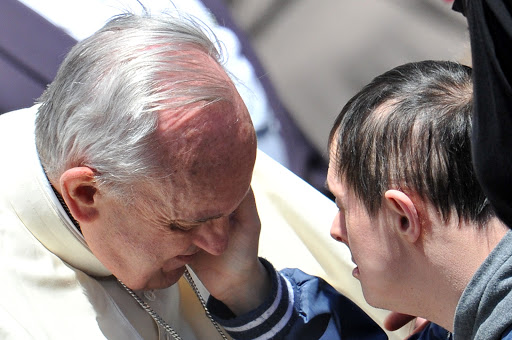
[1] Rudolf Schnackenburg, Amicizia con Gesù, Brescia 2007, p. 68. [ The Friend We Have in Jesus, Westminster John Knox Press, 1997]
[2] Synod of bishops, Preparatory Document. For a Synodal Church: Communion, Participation and Mission, No. 2.
[3] Bishops’ Conference of England and Wales, Coronavirus and Access to Treatment, 20 April 2020.
[4] USCCB – Public Affairs Office, Statement on Rationing Protocols by Health Care Professionals in Response to COVID-19, 3 April 2020.
[5]Autobiography, 15, 5.
[6]Extraordinary Moment of Prayer during the Pandemic, 27 March 2020.
